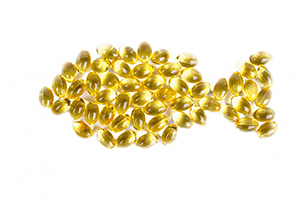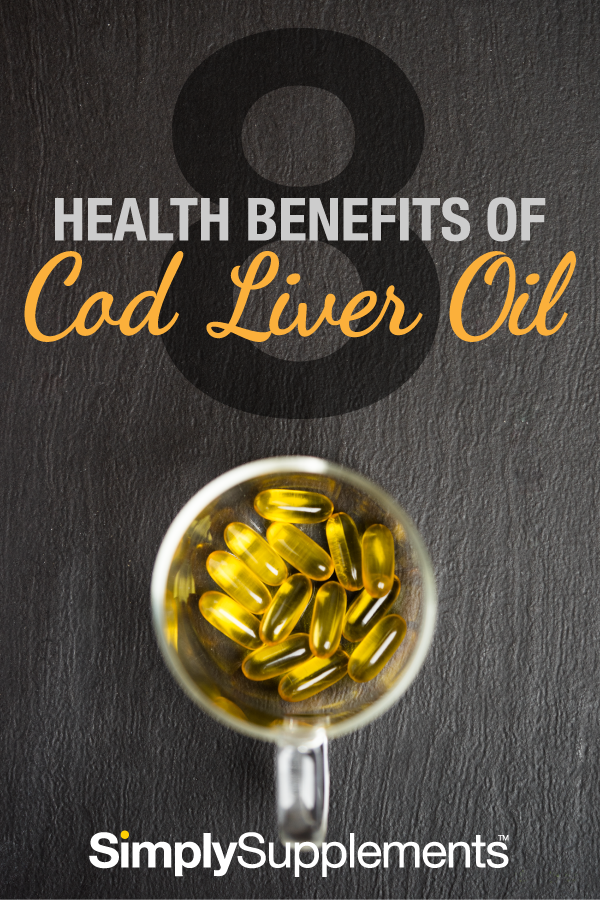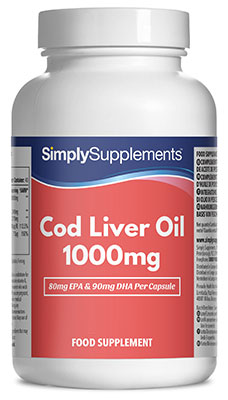Health Benefits of Cod Liver Oil

As the name suggests, cod liver oil is the oil taken from the liver of fish from the cod family. Cod liver oil is a very rich source of the omega 3 essential fatty acids EPA (eicosapentaenoic acid) and DHA (docosahexaenoic acid).
Currently in the UK, it is recommended that everyone tries to ingest two portions of fish per week, with at least one of these portions being oily. One portion is equal to 140g. Fish which are classed as oily are salmon, mackerel, fresh tuna, sardines, pilchard, trout and herring.
It is thought that unfortunately only around a third of us are reaching this recommendation, meaning that many of us are not ingesting sufficient amounts of key nutrients to support optimal health. The effects of cod liver oil are beneficial to everyone, but these results are augmented in individuals who have a low dietary intake of fish and seafood.
As a result, many of us are choosing to supplement with fish oils such as cod liver oil to improve our health.
Carry on reading to find out why cod liver oil is widely regarded by nutrition experts as one of the best supplements you could take.
What Are the Health Benefits of Cod Liver Oil?
Cod liver oil has a wide range of health benefits. These include:
Combatting Inflammation
 Chronic inflammation is believed by numerous, highly respected scientists to be a cause of many disease states commonly seen in the western world such as cancer, heart disease, diabetes and dementia to name just a few. It is believed that a diet too high in omega 6 and not high enough in omega 3 is contributing to this chronic inflammation.
Chronic inflammation is believed by numerous, highly respected scientists to be a cause of many disease states commonly seen in the western world such as cancer, heart disease, diabetes and dementia to name just a few. It is believed that a diet too high in omega 6 and not high enough in omega 3 is contributing to this chronic inflammation.
A typical western diet gets overloaded with omega 6 through the high intake of polyunsaturated oils present in processed and fried foods. This issue is compounded by the low intake of oily fish, flaxseeds and walnuts which are good sources of omega 3.
Research has shown that western countries have an omega 6:3 ratio of around 15-20:1. It has been shown that a much lower ratio (4:1) is associated with a 70% decrease in all-cause mortality. Put simply, daily fish oil provision alongside a reduction in fried and processed foods could be the best lifestyle change one could make to fight off a plethora of chronic diseases that have unfortunately become all too common.
Cognitive Function
It has been scientifically proven that DHA helps contribute to the normal functioning of our brains. Under the umbrella of cognitive function, DHA has been shown to:
• Reduce episodes of aggression – In healthy individuals, this essential fat has been shown to decrease aggression in response to stressful situations. Furthermore, aggression has been shown to be reduced in young men over a 12 week period that had a previous history of aggression. These benefits were seen with daily doses of 1.5g and 672mg of DHA respectively.
• Improve memory and learning – Clinical trials have shown that DHA appears to promote benefits in reference and working memory. Another study has showed that in young adults with a low fish intake, daily fish oil supplementation improved memory retention and reaction time. In older adults, there has also been found to be a relationship between DHA concentrations and verbal fluency.
• Improve symptoms of depression – A meta-analysis of randomised control trials conducted in 2009 found evidence to suggest that daily DHA ingestion is effective at improving symptoms of depression in severely depressed, but not mildly depressed individuals. A meta-analysis is widely regarded as the pinnacle of scientific evidence as it collates the results of numerous smaller studies that address the same specific research question. It is also thought that fish oils work in synergy with other anti-depressive medication.
• Attenuate cognitive decline – A higher intake of fish and seafood is correlated with a decreased risk of suffering from dementia. EPA is also thought to help preserve brain mass into advancing age.
• Reduce symptoms of ADHD – Supplements that provide a rich source of both EPA & DHA have been shown to mildly improve ADHD symptoms in children. Analyses also indicate that these benefits are greater in children who have a lower baseline level of EPA in their blood.
Vision
It has also been scientifically proven that DHA contributes to maintaining eye health. DHA is thought to help vision by maintaining capillary integrity, combatting inflammation and reducing the incidents of pathologies related to the eye. A daily intake of DHA is also very important for infants, as this essential fatty acid contributes to normal visual development in the first 12 months of life.
Heart Health
 The omega 3 fatty acids EPA and DHA have been scientifically proven to help the normal functioning of the cardiovascular system.
The omega 3 fatty acids EPA and DHA have been scientifically proven to help the normal functioning of the cardiovascular system.
High blood triglyceride levels are a risk factor for heart disease. Fish oils have been consistently shown to markedly reduce blood triglyceride levels (to the magnitude of 30%) in individuals who suffer from chronically elevated levels. This is clinically relevant and was therefore patented as Lovaza, which is an ethyl ester form of omega 3 containing a very high purity of EPA and DHA.
Sticking with the theme of blood markers, low levels of HDL (‘good) cholesterol and high levels of LDL (‘bad’) cholesterol are also risk factors for heart disease. Omega 3 fats have been shown to correct this imbalance.
Furthermore, fish oils have also been shown to relax blood vessels. This often helps normalise blood pressure in individuals who suffer from hypertension.
As a result of this evidence, anyone who is aiming to support cardiac health should look no further than fish oils for protecting the health of the body’s most important muscle.
Protein Synthesis in Older Adults
Omega 3 supplementation has been shown to be beneficial for muscle mass in older adults. Sarcopenia is the age-related loss of muscle mass and is caused by numerous complex factors.
One of these factors is a high level of inflammation, which negatively impacts our ability to build muscle and may accelerate muscle loss. It is no surprise then that fish oil supplementation has been shown to help body composition in older adults. Having high levels of muscle and strength into advancing age will go a long way towards maintaining quality of life and independence.
Foetus Development
DHA has been scientifically proven to contribute to normal brain and visual development of foetuses and breastfed infants. As a result, it is of high importance that pregnant women and women that have recently given birth receive a regular and rich supply of omega 3 fats to help support their child.
Vitamin A
Cod liver oil stands out from other oils due to it not only containing high levels of EPA and DHA, but because it is a rich source of vitamins A and D.
Vitamin A has various roles in the body such as:
• Contributing to the normal metabolism of iron
• Maintaining mucous membranes
• Skin health
• Supporting immune function
• Supporting eye health
• Aiding the process of cell specialisation
Although it is known that the omega 3 fats (especially DHA) are influential in the cognitive and visual development in foetuses, the high vitamin A content may mean that cod liver oil is not suitable for pregnant women, or women aiming to conceive.
If this is the case, then an alternative supplement such as omega 3, krill oil or salmon oil would be a sensible choice. These supplements are high in EPA and DHA, but have no vitamin A (or vitamin D).
Vitamin D
Cod liver oil is a great supplement to take all year round, but even more so during the autumn and winter months. This is because it contains relatively high amounts of vitamin D. This essential nutrient is only found in a small number of food items such as egg yolks, fish, and fortified products.
Fortunately, through the spring and summer, we have the ability to synthesise adequate vitamin D through sunlight exposure. However, during autumn and winter our skin is not exposed to enough sunlight to meet our needs. This is a major issue, especially in the UK, and it comes as no surprised that a vitamin D deficiency is the most common deficiency in the developed world.
This has led the UK government to recommend that everyone supplements with vitamin D throughout the autumn and winter seasons. This is for good reason too, as vitamin D has an integral role in a variety of different bodily functions such as:
• The absorption and utilisation of calcium and phosphorus, which are essential for bone health
• The regulation of blood calcium levels
• The maintenance of normal muscle function
• Healthy teeth
• Immune function
• The process of cell division
• Bone growth and development in children
• Reducing the risk of falls and postural instability in adults over the age of 60.
Vitamin’s A & D are both fat-soluble vitamins, meaning that for them to be efficiently absorbed and transported they need to be ingested alongside fats. As cod liver oil provides a rich amount of fatty acids, these vitamins have the nutrients they needs to be able to exert their beneficial effect on our bodies. Cod liver oil is therefore a comprehensive supplement that many people would not do without!
What Are the Health Concerns of an Omega 3 Deficiency?
 Unfortunately, vegetarians and vegans often do not achieve an adequate intake of the omega 3 fatty acids. Although omegas 3s are present in foods such as walnuts and flaxseeds, these are the fatty acid called alpha linolenic acid (ALA) and not EPA or DHA.
Unfortunately, vegetarians and vegans often do not achieve an adequate intake of the omega 3 fatty acids. Although omegas 3s are present in foods such as walnuts and flaxseeds, these are the fatty acid called alpha linolenic acid (ALA) and not EPA or DHA.
Fortunately for these individuals, the body adapts to the lack of EPA & DHA by being able to use ALA as a precursor to manufacture them. This process happens in the liver; however it is not efficient and requires a high amount of dietary ALA to be effective.
What Are the Side Effects of Cod Liver Oil?
Cod liver oil on the whole is a very safe supplement that exerts a wide range of health benefits. Some minor side effects such as stomach complaints, burping or an unpleasant taste in the mouth are sometimes reported. Serious allergic reactions to this supplement are very rare, but you should contact a doctor immediately if you experience swelling around the face and mouth.
How Much Cod Liver Oil Should I Take?
Most people see benefits of cod liver oil when taking 1-2g per day. However, the benefits are not seen from the absolute amount of cod liver oil per se, but more importantly the amount of EPA and DHA that the supplement contains. Make sure you look for a supplement that uses high-quality ingredients and manufacturing procedures to ensure that each capsule contains a rich source of EPA and DHA.
It is also believed that turmeric extract (often known as curcumin), fenugreek and taurine work in synergy with the omega 3 fats to help certain health parameters such as anti-inflammation, weight management and insulin sensitivity. Future research will help to further substantiate these beliefs, but as these other nutrients are health-promoting, there should be no reason why fish oils could not be taken in conjunction with these supplements.
Summary
In summary, fish oil supplements that contain a rich source of the essential omega 3 fats EPA and DHA represent a safe and cost-effective way to provide a potentially massive boost to a wide range of health parameters. These benefits also seem to be accentuated in individuals who do not achieve the recommended weekly intake of fish (which is thought to be two thirds of us). So, simply incorporating a fish oil supplement into your lifestyle could be one of the easiest ways to improve health and fight off a myriad of diseases.
Take home messages:
• Cod liver oil is a rich source of the omega 3 essential fatty acids EPA and DHA. Further to this, cod liver oil contains high amounts of vitamin A and D.
• EPA and DHA positively impact our health in many ways. These include, but are not limited to: anti-inflammation, improved cognitive function, cardiovascular health, vision, protein synthesis and health development in foetuses and infants.
• Unfortunately, EPA and DHA are almost exclusively found in fish products, so vegetarians and vegans will struggle to achieve the amounts thought to be optimal for health.
• 1-2g of fish oil per day appears to be beneficial for most people. Look for a high-quality supplement that contains rich amounts of EPA and DHA.
• For the vast majority, fish oil supplementation will be very safe. Minor side effects such as stomach upsets, burping and a strange aftertaste will sometimes be experienced.
Shop for Cod Liver Oil supplements here

Sources:
https://www.ncbi.nlm.nih.gov/pubmed/8613538
https://www.ncbi.nlm.nih.gov/pubmed/23625531
http://jn.nutrition.org/content/early/2010/02/24/jn.109.119578.abstract
https://www.ncbi.nlm.nih.gov/pubmed/10430487
https://www.ncbi.nlm.nih.gov/pubmed/23515006
https://www.ncbi.nlm.nih.gov/pubmed/20439549
https://www.ncbi.nlm.nih.gov/pubmed/17101822
https://www.ncbi.nlm.nih.gov/pubmed/22855869
https://www.ncbi.nlm.nih.gov/pubmed/20491709
https://www.ncbi.nlm.nih.gov/pubmed/9129504
http://advances.nutrition.org/content/6/4/452.full

 Nicole
Nicole 

























